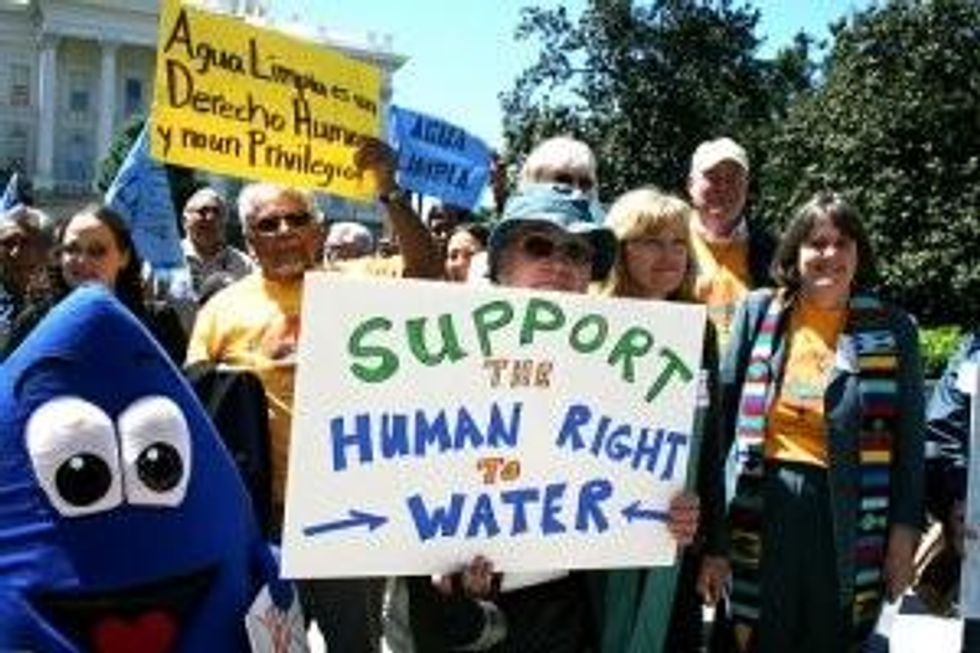It had been billed as a summit to push for universal access to water, but attending the Budapest Water Summit held last week felt like grasping at a mirage of water in a desert. The slogans and appearance were attractive, but held no prospect of delivering the human right to water for all. Behind the mirage lay the same corporate players and market-driven processes that continue to deny access to the world's most critical resource to millions of people.
The mirage was evident firstly in the process. The conference constantly emphasized its participatory nature, encouraging different stakeholders to produce recommendations for the 'Budapest Water Summit statement' that could also act as a basis for governments' commitments to the Sustainable Development Goals (due to replace the Millennium Development Goals in 2016). But this facade of consultation merely hid the real drivers of discussions and debates.
For a start the conference was hosted by the Hungarian government partnering not only with the neoliberal thinktank the World Water Council, but also with controversial companies like Nestle and CocaCola who are notorious for their unsustainable use of water that has deprived poor communities as a result.
In discussion after discussion, those who chaired or facilitated sessions were themselves responsible for policies and practices that have excluded peoples' access to water. The Youth Forum and the civil society forum's discussions on pricing of water, for example, were facilitated by Global Water Partnerships (GWP), led by the World Bank. This multilateral institution's record is controversial, given the role they played in enforcing failed privatization projects around the world. The failure of their approach - that has led to a wave of communities taking privatized water firms back into public hands - did not seem to affect the World Bank's faith and advocacy that water prices are most efficiently determined by 'the market'.
Similarly, the governance session during the civil society forum was chaired by the 'NGO' Oieau, established by French water multinationals Suez and Veolia. Suez is currently accused by civil society groups in Jakarta of bullying local authorities; In Barcelona Suez doesn't even operate with a proper contract. None of the organizers, it seemed, appeared to question why companies that have been constantly ejected from communities for price-hikes and profiteering, might not be considered the best facilitators for discussions of governance.
The topics on the conference agenda - universal access to water and sanitation, integrated resources management, water-energy-food nexus, water governance, "green economy", and financing water and sanitation - also obscured real discussions about power: about those profiting and those excluded from decisions around water.
The results were a fuzzy and slippery debate. Discussions about water governance, for instance, failed to focus on the obligations of governments to regulate polluting and water- grabbing companies and the obligation of public authorities to ensure access to water for all. Instead discussions centered around 'innovative' approaches such as partnerships between multi-stakeholders (to find joint solutions) and a discourse of "green economy", which is about letting markets decide the most efficient allocation of water resources.
In discussions about water scarcity, only solutions involving new technologies, large investments and new market opportunities seemed to be considered relevant. Locally-managed, low-cost solutions got far less attention than they deserve. There was far more interest in talking about how much corporations can contribute to cleaning up polluted water to re-use, rather than how to make industry stop polluting water in the first place.
Representing TNI, I worked closely with other water justice activists from groups likes Blue Planet Project, Food and Water Europe, Public Services International and the Indonesian NGO coalition Kruha, to constantly make critical interventions in different sessions.
To counter a narrative that leaves water decisions to the market - and therefore to the powerful companies that are motivated by profit rather than the human right to water - we argued that water tariffs should be determined democratically. It is a political decision how to finance water provision. As water is life and right to access to water can not be denied, we proposed public policies such as progressive tariff structures with cross subsidization and taxation as the keys to finance water provision. We argued that "multi-stakeholder participation" - a popular narrative in the conference - are invariably designed by actors who hold power.
Ultimately our experience of working with communities worldwide seeking to reclaim control of public water showed that summits like Budapest are the opposite of democratic participation in decision making. These communities struggling for control of water, often against corporations, were noticeably absent from the plush conference surroundings in Budapest. However it is these communities - rather than markets or fuzzy multi-stakeholder events - that need to be leading the discussions on choice of technology, priority of investments and allocation of water. Until that happens, we will continue to grasp at mirages.
_____________________
